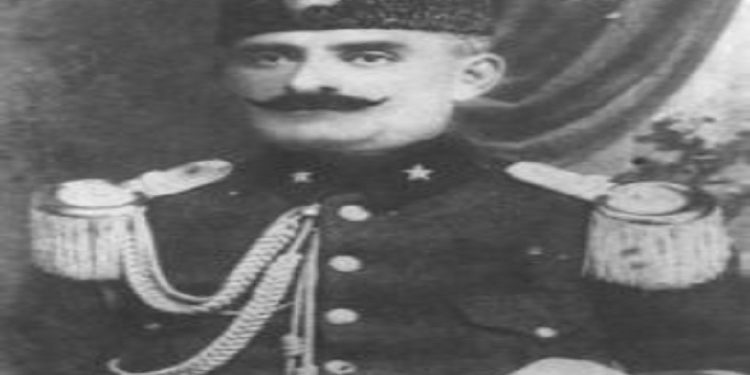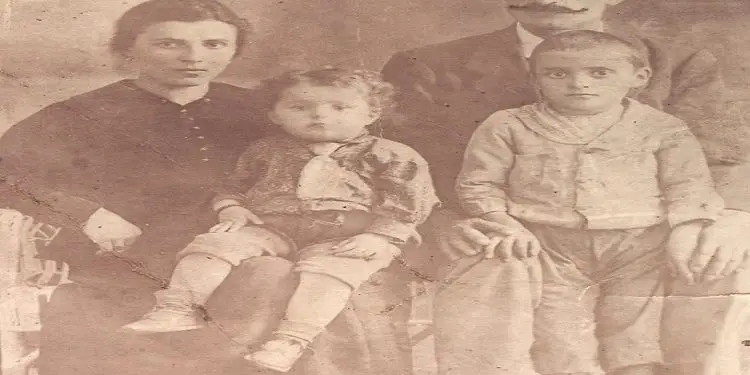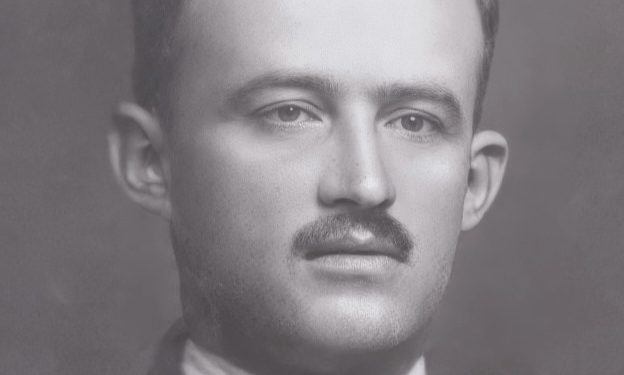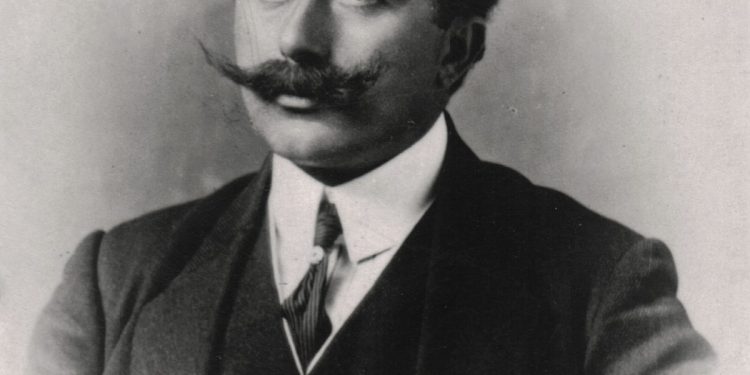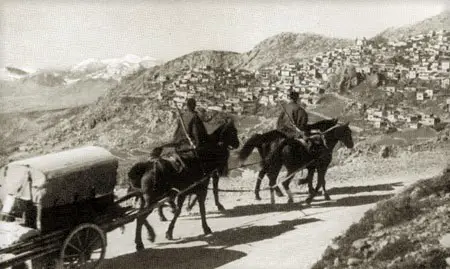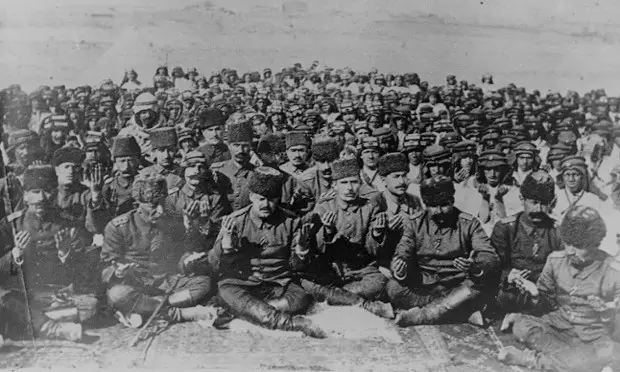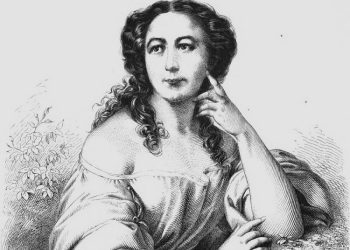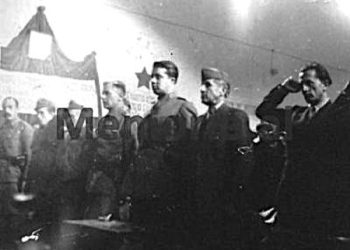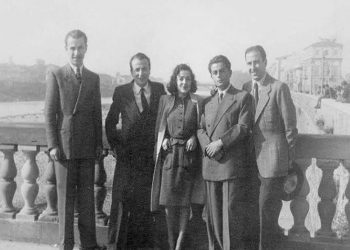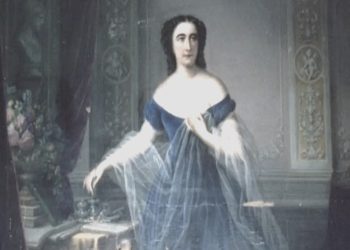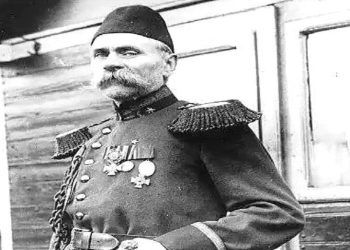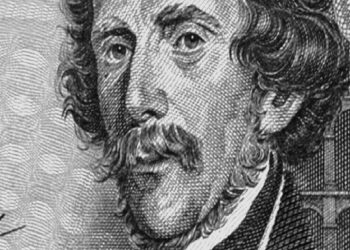Memorie.al / Although there is a whole mountain of historical documents and facts, known here in our archives, but also unknown in the annals of the Turkish-Ottoman administration of the early 20th century, which unfortunately, no one has bothered to bring to light, the figure of the patriot Tefik Rogu has been vaguely described only in some newspaper article, a historical publication of the region, or his name has only been mentioned in a casual speech during national holidays. We cannot definitively say and we cannot prejudge why this happened. But what we can say, with the materials we have in hand, is that such a figure of this level and historical quality, who dedicated his entire life to the national cause, falls within our best traditional values, and therefore deserves more attention.
Who was Tefik Rogu
Tefik Xhemal Rogu was born in October 1875, in the village of Rog in Skrapar, into a family known throughout the region for its traditions of work, hospitality, respect, but also for its fighting and patriotic traditions. His father, Xhemal, and his uncle, Hysen, were members of the League of Prizren, Frashër Branch. Later, they joined the freedom-fighting çetas (bands) for independence, until both were killed on the same day, not far from their village, where Turkish forces had set a trap for them. Even to this day, the people’s memory brings these fighters to life with these verses: “Bregu i Madh, Qaf’ e Lipecit, / Fire burns, the ground lights up, / Xhemal and Hysen call out: / Ottomans where are you going?”
Tefik was only 7 years old when his father was killed, the eldest of three boys. His maternal uncle, Emin Selenica, offered a helping hand to his sister, Lushje, and took Tefik away during those days of mourning, sending him abroad. During the painful separation, his mother sewed a small bag filled with tiny stones from Rog under his collar and instructed him not to forget them, his brothers, or the village. In Istanbul, his uncle enrolled him in school. From the very beginning, he stood out for his excellent results. But his talent became more visible in high school, culminating in a special diploma in Law.
The Turkish military authorities needed police officers and gendarmes more than judges, whose work was done by kadis and muftis, so they sent Tefik to the Police Academy. He also completed this school with high marks, which is why he was appointed to important police positions in various regions of Turkey from the beginning of his career. Tefik Rogu knew six foreign languages and had a very rich library.
In Monastir, the Hearth of Patriotism
He put the Oriental education and culture he received in Turkish schools and academies, and his intellectual formation, at the service of the national cause. While still in Istanbul, he connected with the most important figures of the Renaissance active there, Hasan Prishtina and Ismail Qemali, who also helped him, complete another school, the one for Diplomacy. But the most ideal opportunity to pursue the goal he had set for himself came when he was appointed, in 1905, as the commander of the Vilayet police, with the city of Monastir (Bitola) as its center. Tefik was now closer to his homeland, but also in a key location for patriotic activity.
Monastir at that time had almost broken away from Turkish control and “spoke Albanian.” The establishment of the “Secret Committee,” which was among the first in the anti-Ottoman movement of the early 20th century, besides many other factors for why this committee was based precisely in Monastir, had one more reason… that Tefik was there, who not only watched over but acted as one of the most active members of this organization, which included Bajo Topulli, the former vice-director of the Turkish gymnasium in Monastir, Fehim Zavalani, Colonel Halit Bërzeshta, Gjergj Qiriazi, and others. The “Monastir Committee” extended its branches throughout Southern and Northern Albania.
Being close to his birthplace also created opportunities for Tefik to contact close people and activists who were operating inside the country to spread the Albanian language, such as: Baba Fetahu of Backa, Meleq Staravecka, Hasan and Dalip Koprëncka, etc. He would give them books and primers that came from Sofia and Bucharest. Sometimes he would use his leaves and holidays and come to the village, bringing books and teaching the young people the Albanian language.
In the Sahara, with a 101-Year Sentence!
But the activity of the “Monastir Committee” was sniffed out, so in May 1906, the center moved to Bucharest, leaving a small regional committee in Monastir. Meanwhile, the çeta of Bajo Topulli, composed of villagers and some students who had fled Monastir, found the support of Sali Butka in Kolonja, but later, pursued by Turkish forces, the brothers Bajo and Çerçiz Topulli were forced to leave Albania for Bucharest and Sofia. In Bucharest, they were joined by the ardent patriot Mihal Grameno, who then became part of Çerçiz’s çeta and tried to spread national sentiments.
The Turks had an easier time with Tefik, whom they had been tracking for some time; they arrested him and sent him to Istanbul, where they held a sensational trial, which would serve as a lesson for all those intellectuals and officers who sympathized with, or had become part of the Young Turk Movement, and those who helped the rebels opposed to the empire. Tefik was sentenced to death, but thanks to his connections, popularity in intellectual circles, and dignified appearance in court, a fact appreciated by the judges, his sentence was reduced to 101 years in prison, which was still more than a human lifetime.
Here is another detail regarding the reduction of the sentence from capital punishment to 101 years, which family members heard from Tefik himself that one of the members of the judging panel valued as a mitigating circumstance: Among the confiscated materials, a medallion in the shape of a seal used at the time was presented as material evidence. The seal had three sections and three symbols. When the judge asked for the decoding, Tefik explained that the top section, where some small stones were drawn, represented the bag of earth his mother had given him when he left for Istanbul as a child; in the middle section, a clock was drawn, indicating that time was working for the future; and in the third section, there was an eagle, which many Albanians at that time carried as a patriotic symbol.
Sejfi Vllamasi, in his book “Political Confrontations 1939-1943,” writes about the Monastir Committee: “…The arrests begin; on May 22nd I was arrested, two days later I was handed over to the high-security prison in Istanbul…! Two weeks later, a Bulgarian prisoner from Kastoria informs me of the arrival in prison of Tefik Rogu (from Skrapar), a member of the Committee and police commissioner of Monastir, to whom, upon his request, I sent two Napoleons (gold coins)…! In the summer of 1907, I received a letter from Feim Zavalani and Jashar Hajri Bitincka, sent from the Castle of Aqa…! Through which I learned of their penetration into that castle…! As for Tefik Rogu (Skrapari), he was sentenced to 101 years in prison and for the serving of the sentence, he was sent to prison in Fazan, a sub-prefecture of Tripoli in Libya, an African area in the Sahara, and a two-month journey by camel from Tripoli…!”
Always in Action
In 1908, after the proclamation of the Hürriyet (Liberty) by the Young Turks, Tefik Rogu was released and returned to his homeland, where he immediately connected with the most famous figures of the time operating in Skrapar, with his old friend Sali Butka, Ali Farmaqi, Lace Backa, Meleq Staravecka, Sulejman Staravecka, Maksut Çeta (Grëmshi), Baba Tahir Çepani, Servet and Hysen Zaloshnja, Xhemal Malindi, Myftar Çepani, etc. Alongside his patriotic activity, he gathered his fellow villagers and taught them to read and write, teaching them the verses of Naim Frashëri. The villagers remember how once, the Turkish zaptiyes (gendarmes) came, tied him up, and pulled out two of Tefik’s molars with a horse’s pincers, because he was gathering the villagers.
With Military Duties in the Government of Vlora
The Proclamation of Independence on November 28, 1912, overjoyed the entire Albanian people, but also mobilized all the fighters who had worked for this day, to protect and strengthen the new Government of Vlora. Tefik hurried to Vlora. After a meeting with his old friend, Ismail Qemali, whom he had known since Istanbul, he received duties from him for the formation of the Guard, the Police, and other defense structures. Together with Isa Boletini and Ali Shefqet Shkupi, after preparing the regulations, they undertook the organization of the Vlora police.
Tefik was put in charge of it, but in addition to this, he also dealt with the establishment of gendarmerie structures in Korçë, Ohrid, Elbasan, Berat, and Durrës. In Durrës, he was openly opposed by Esat Pasha Toptani, a fact that is proven in a letter Tefik sent to the Elder of Vlora, on September 12, 1913, where among other things he writes: “…As an envoy to the Durrës police, together with the commander of the gendarmerie, we were expelled based on a telegraphic order sent by Esat Pasha. From Tirana to Durrës the situation has changed, actions aiming for the death of Albania have started to gain momentum.”
His concerns, when he saw that behind Ismail Qemali’s back, games were being played to destroy what was built with so much effort, are also reflected in this letter dated October 3, 1913, addressed to Vlora, where the betrayal of Esat Pasha Toptani and his influence in Skrapar are mentioned: “…The news coming from Skrapar is not so good…”. Further in the letter it is said: “…I can remind Your Excellency, when the Greek andartes (irregulars) had entered Korça, after a little propaganda, I brought 1500 armed men into the mountains of Kolonja, within 24 hours.”
The archival documents of the activity of the Government of Vlora testify to how devotedly Tefik worked, but also show another thing: that he openly enjoyed the trust and sympathy of Ismail Qemali. Following the situation created on the Skrapar front, where the main blow was being dealt to the Greek forces, which wanted to capture Berat, Ismail Qemali ordered a change in the leadership in Skrapar, appointing Themestokli Gërmenji as sub-prefect, Servet Zaloshnja as secretary, and Tefik Rogu as commander of the gendarmerie and member of the defense staff.
This fact is also confirmed by the letter that the Minister of Agriculture of the Vlora Government, the patriot Pandeli Cale, sent to the head of government those days, where he writes: “Ismail Bey, Themestokli Gërmenji is going to Berat tonight. The letter you gave him appointing him Veqil Kame (a placeholder title/representative), he could not take with him. I beg you, therefore, inform the Mütesarrıf (Governor) of Berat, so that Themesokliu goes to Skrapar together with Tefik Rogu, as the commander of the gendarmes there.”
Even though the Government of Vlora was coming to an end, he had faith in the people and in the luminous figure of the Elder of Vlora. As a loyal friend, he does not hide his admiration for him, when he writes: “The people of Skrapar love and adore Your Excellency…! You, who experienced greatness, will be able to overcome difficulties and bring a period of peace to this Homeland. I am reporting to you as an old, loyal friend, with the aim of informing you about what is happening…!”
Again in Turkey, Welcomed
For a man who had worked body and soul for the materialization of the long-standing dream with the Government of Vlora, its fall and fading away in that manner was a great sorrow. Like many of his friends and comrades, Tefik was also disappointed. With the instructions and recommendations of Ismail Qemali, who went to Italy, Tefik left for Istanbul. Turkey at this time was looking for new paths, different from the medieval ones, to create a new national and state identity. The time that had passed had erased many things, so Tefik was welcomed and rehabilitated by the Turkish authorities.
He was appointed to high positions in the police and gendarmerie, but as always, he was also involved in other activities, such as keeping the patriotic spirit alive and uniting the Albanians in Istanbul, the younger generation, as the first ones had left and completed their mission. On his initiative and with the contribution of many of his compatriots, he established two Albanian schools, one named “Kosova,” where he appointed two of the best Albanian students, Musa Ohri and Qemal Sanjollasi, as teachers. After many years in Istanbul, even though his children were there, he grew tired and sought to return to his homeland.
The Letter
His longing for his birthplace and his desire to contribute to his homeland is also evidenced by a letter sent to a friend in Albania, on June 16, 1919, where he inquiries about his friends, comrades, and fellow villagers; “where they are, how they are, and what they are doing?!” “Please ask around and write to me,” he writes further, adding: “I want to return to Vlora or Shkodër. Therefore, I strongly ask you, upon receiving this letter, to prepare and send me a document from the Austrian government (?!) of Vlora and to deliver it to the necessary office here, stating that there is no prohibition for me to come and enter Albania.” At the end of 1920, with the help of his friend in arms from the XIX Division in defense of the Gallipoli Peninsula, who had now become a well-known and sympathetic figure, Qemal Atatürk, he finally returned to Albania.
New Troubles
As soon as he arrived in Albania, at the beginning of 1921, he was appointed commander of the police of the Berat Prefecture. And as always, he did not confine himself to his duty but became integrated into the political and military life of the time, where he stood out as a capable analyst and publicist. In the period 1922-’24, he wrote dozens of articles in the press of the time. His saying in the political analysis of the day’s problems, in a writing dated July 22, 1922, in the newspaper “Shqipëria e Re” (New Albania), where he regularly wrote, has remained proverbial, stating that…: “…it must be clear that governments do not make the people, but the people make the government.”
As is known, in 1922, the government led by Ahmet Zogu was formed. In Skrapar, there was great resistance from democratic forces and old patriots and fighters against the candidacies of the Beys of Berat, who were presented in this region. They formed the “National Democratic Group,” with the most prominent activists of the region, to have their own representatives in parliament. A great polemic at that time was carried out in the press by Riza Cerova and Tefik Rogu, also in the capacity of a member of the opposition group, where they factually unmasked the class of beys and the abuses of state administration officials. Naturally, as a political opponent, Tefik was dismissed from his post and isolated in his village, in Rog, where he was forbidden to leave without the permission of state authorities.
Later, when things calmed down somewhat, his friend, Milto Tutulani, recognizing his legal and administrative abilities, helped him obtain a lawyer’s license. Thus, for a long period, he worked as a lawyer in Berat, Skrapar, and Përmet. During this time, he maintained ties with anti-Zogist leaders, especially with Riza Cerova, who considered Tefik one of his best advisors on military matters, but also for assessing situations.
‘Whole’, with the Last Duty
The fascist occupation of our country found Tefik in his village, in Rog, at an advanced age and in a serious state of health. All those movements and especially the Sahara prison, where he had suffered the most inhumane tortures, would inevitably take their toll one day when his strength waned. But the time and the war that had broken out still demanded action. Thus, the spirit of a fighter like him could not rest. He opened the doors floor by floor for the “boys of the mountain.” The Communist Party organization for the Çepan area was formed in his house, which included Haki Bejko (Sevrani), Skënder Malindi, Rushit Dervishi, Rakip Telhai (Qeshibesi), Haxhi Kapsi, Novruz Malindi, and his son, Hysen Rogu, who later distinguished themselves in the war, but also in high state duties.
Besides Hysen, Tefik also sent his two daughters, Bukuria (Beauty) and Liria (Freedom), to the mountains in the partisan units, who also participated in the Congresses of the Anti-Fascist Woman and Youth in Berat and Helmës. His wife, Hazbija, was one of the most prominent activists in the area. Tefik Rogu died on April 15, 1945, feeling ‘whole,’ as he said, because he had also completed his last duty, with his children, who followed the best path, the path he could not continue due to his age. On the occasion of the 50th Anniversary of the Proclamation of Independence, the former Presidium of the People’s Assembly of Albania awarded him the “Order for Patriotic Activity.” / Memorie.al




